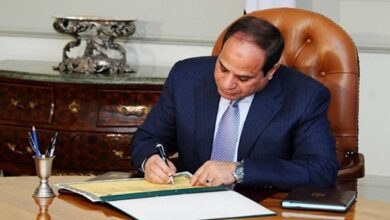Widespread corruption in government institutions was one of the triggers for the 25 January revolution that toppled former president Hosni Mubarak and his regime. Now, many from the regime, including the fallen president and his inner circle, are under investigation. But as investigations proceed, they will encounter a challenge: a lack of whistleblowers.
Protection for public employees and other citizens who expose cases of corruption is considered vital for fighting corruption and abuse of power, but in Egypt, where these problems run rampant, there are no legal provisions to protect citizens bringing unsavory truths to light.
According to the Global Integrity report, Egypt scored "very weak", as data showed “a deterioration of the country’s already weak transparency and anti-corruption framework from mid-2009 to mid-2010” – the period leading up to the revolution.
Whistleblowers and those who report corruption provide an important method of prevention, but in Egypt they are usually subject to harassment, discrimination and even death threats.
The recent case of Fareed Hasheesh exemplifies the problems genuine whistleblowers face, even in a post-Mubarak Egypt.
Hasheesh, a legal researcher at the forensics authority, appeared on television last week and revealed violations inside the institution, including the fabrication of medical reports by the head of forensics, Al-Sebaie Ahmed al-Sebaie. Hasheesh specifically accused Sebaie of fabricating the autopsy report of Khaled Said, a young man beaten to death by police in Alexandria who subsequently became a symbol of police brutality in Egypt.
The day after Hasheesh’s television appearance he was remanded for interrogation by the public prosecutor after Sebaie accused him of slander and public defamation, a move that enraged activists and civil society organizations who saw this a step backwards in the path of reform.
As if to vindicate Hasheesh, Sebaie was recently sacked by the Minister of Justice and is under investigation on charges of forging autopsy reports of those who died during the revolution.
The minister of justice, Mohamed Abdel-Aziz El-Gendy said Sebaie was dismissed for making statements on TV that were incompatible with the traditions of judicial bodies when he disclosed results of reports that are still under investigation by the public prosecutor.
Gamal Eid, director of the Arab Network for Human Rights Information and Hasheesh’s lawyer, went as far as to question the integrity of the attorney general, calling him part of the old regime.
“The same entity that used to suppress Mubarak’s opposition is now investigating him and his corrupt system,” said Eid. “Egypt doesn’t have a just judiciary and prosecution system and the people don’t sense justice.”
However, Ghada Moussa, secretary general of the transparency and integrity committee, a body that oversees administrative corruption under the umbrella of the Ministry of Administrative Development, blames this on Egypt’s flawed laws.
“Fareed Hasheeh is among many whistleblowers who keep facing such charges as the law in many cases protects the violator even more than the whistleblower,” said Moussa.
While the law gives employees and citizens the right to report on wrongdoings in government institutions, Law 62/1975 penalizes cases of false whistleblowing with fines ranging from LE100 to LE500, or at least six months in jail.
“The law doesn’t in anyway mention protection of whistleblowers,” Moussa said. “This lack of sufficient legal protection and stand-alone laws that protect whistleblowers in Egypt deters anyone from reporting corruption, including journalists.”
When whistleblowers report violations to an monitoring body such as the Administrative Control Authority, they are in most cases required by law [BN2] to provide their full personal information, making it easy for defendants to take revenge.
“We receive a huge number of complaints from employees who are subject to harassment that includes denying them promotions, bonuses, training and much else just because they reported corruption cases in their workplace,” said Moussa.
She added that citizen whistleblowers have complained of intimidation that includes the seizure of their private property and, in some extreme cases, death threats.
Omnia Hussein, the Egypt program coordinator for Transparency International, an international NGO that monitors corporate and political corruption, says that during Mubarak’s reign, there was no political will to draft whistleblower protection laws, even though Egypt ratified the United Nations Convention Against Corruption in 2005. The convention includes an article that obliges signatories to set up measures and systems to facilitate public officials reporting of acts of corruption.
Additionally, the civil servants law requires an employee to exhaust internal procedures before reporting to an external regulatory body. This means an employee must first complain to his superior: thus in some cases whistleblowers could be reporting a violation to the violator.
Often a superior has far-reaching powers that could be exploited to punish the whistleblower, such as writing a poor evaluation or making wage deductions, said Moussa.
The lack of clear mechanisms for and the long-winded process of reporting corruption may further discourage people from reporting.
Both Moussa and Hussein say that a whistleblower protection law should be drafted, accompanied by a law that guarantees the right to access government information. This would uproot corruption and provide the necessary safeguards for whistleblowers.
As hundreds of corruption investigations proceed in governing bodies and businesses across Egypt, this could be an important step in bringing abusers to justice.




